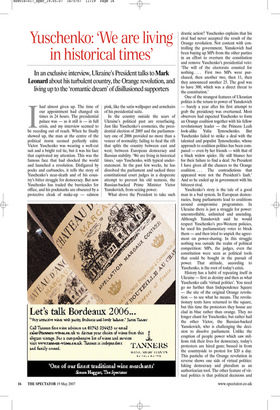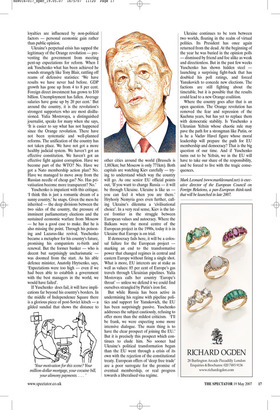Yuschenko: ‘We are living in historical times’
In an exclusive interview, Ukraine’s President talks to Mark Leonard about his turbulent country, the Orange revolution, and living up to the ‘romantic dream’ of disillusioned supporters Ihad almost given up. The time of our appointment had changed six times in 24 hours. The presidential palace was — as it still is — in full crisis, and my interview seemed to be receding out of reach. When he finally showed up, the man at the centre of the political storm seemed perfectly calm. Victor Yuschenko was wearing a well-cut suit and a bright red tie, but it was his face that captivated my attention. This was the famous face that had shocked the world and launched a revolution. Disfigured by pocks and carbuncles, it tells the story of Yuschenko’s near-death and of his country’s bitter struggle for democracy. But now Yuschenko has traded the barricades for office, and his pockmarks are obscured by a protective cloak of make-up — salmon pink, like the satin wallpaper and armchairs of his presidential suite.
In the country outside the scars of Ukraine’s political past are resurfacing. Just like Yuschenko’s cosmetics, the presidential election of 2005 and the parliamentary one of 2006 provided no more than a veneer of normality; failing to heal the rift that splits the country between east and west; between European democracy and Russian stability. ‘We are living in historical times,’ says Yuschenko, with typical understatement. In the past few weeks, he has dissolved the parliament and sacked three constitutional court judges in a desperate attempt to prevent his old nemesis, the Russian-backed Prime Minister Victor Yanukovich, from seizing power.
What drove the President to take such drastic action? Yuschenko explains that his rival had never accepted the result of the Orange revolution. Not content with controlling the government, Yanukovich had been buying up MPs from the other parties in an effort to overturn the constitution and remove Yuschenko’s presidential veto: ‘The will of the electorate counted for nothing.... First two MPs were purchased, then another two, then 11, then they announced another 25. The goal was to have 300, which was a direct threat to the constitution.’ One of the strangest features of Ukranian politics is the return to power of Yanukovich — barely a year after his first attempt to grab the presidency was overturned. Most observers had expected Yuschenko to form an Orange coalition together with his fellow revolutionary leader — the Princess Leah look-alike Yulia Tymoschenko. But Yuschenko failed to strike a deal with the talented and populist Tymoschenko, whose approach to coalition politics has been compared — even by her friends — with that of a black widow spider. He still blames her for their failure to find a deal: ‘As President I have given all the chances to the Orange coalition.... The contradictions that appeared were not the President’s fault.’ And so he ended up in government with his bitterest rival.
Yuschenko’s story is the tale of a good man in a bad system. In European democracies, hung parliaments lead to coalitions around compromise programmes. In Ukraine there is just a struggle for power: uncontrollable, unlimited and unending. Although Yanukovich said he would respect Yuschenko’s pro-Western policies, he used his parliamentary votes to block them — and then tried to unpick the agreement on power-sharing. In this struggle nothing was outside the realm of political competition: MPs, the judges, even the constitution were seen as political tools that could be bought in the pursuit of power. That attitude, according to Yuschenko, is the root of today’s crisis.
History has a habit of repeating itself in Ukraine — first as destiny and then as what Yuschenko calls ‘virtual politics’. You need go no further than Independence Square — the site of the original Orange revolution — to see what he means. The revolutionary tents have returned to the square, but this time the protestors they house are clad in blue rather than orange. They no longer chant for Yuschenko, but rather hail the other Victor, the Russian-backed Yanukovich, who is challenging the decision to dissolve parliament. Unlike the eruption of people power which saw millions risk their lives for democracy, today’s protesters are hired guns; bussed in from the countryside to protest for $20 a day. This pastiche of the Orange revolution in reverse shows one side of virtual politics: faking democracy and pluralism as an authoritarian tool. The other feature of virtual politics is that political decisions and loyalties are influenced by non-political factors — personal economic gain rather than public opinion.
Ukraine’s perpetual crisis has sapped the legitimacy of the Orange revolution — preventing the government from meeting pent-up expectations for reform. When I ask Yuschenko what has been achieved he sounds strangely like Tony Blair, rattling off reams of defensive statistics: ‘We have results we have never had before. GDP growth has gone up from 4 to 8 per cent. Foreign direct investment has grown to $10 billion. Unemployment has fallen. Average salaries have gone up by 20 per cent.’ But around the country, it is the revolution’s strongest supporters who are most disillusioned. Yulia Mostovaya, a distinguished journalist, speaks for many when she says, ‘It is easier to say what has not happened since the Orange revolution. There have not been systematic and well-planned reforms. The unification of the country has not taken place. We have not got a more healthy judicial system. We haven’t got an effective constitution. We haven’t got an effective fight against corruption. Have we become part of the WTO? No. Have we got a Nato membership action plan? No. Have we managed to move away from the Russian needle of cheap gas? No. Has privatisation become more transparent? No.’ Yuschenko is impatient with this critique. ‘I think this is just a romantic dream of a sunny country,’ he snaps. Given the mess he inherited — the deep divisions between the two sides of the country, the pressure of imminent parliamentary elections and the sustained economic warfare from Moscow — he has a good case to make. But he is also missing the point. Through his poisoning and Lazarus-like revival, Yuschenko became a metaphor for his country’s future, promising his compatriots re-birth and renewal. But the former banker — who is decent but surprisingly uncharismatic was doomed from the start. As his able defence minister, Anatoliy Hrytsenko, says, ‘Expectations were too high — even if we had been able to establish a government with the best managers in the world, we would have failed’.
If Yuschenko does fail, it will have implications far beyond his country’s borders. In the middle of Independence Square there is a glorious piece of post-Soviet kitsch — a gilded sundial that shows the distance to other cities around the world (Brussels is 1,883km; but Moscow is only 771km). Both capitals are watching Kiev carefully — trying to understand which way the country will go. As one senior EU official points out, ‘If you want to change Russia — it will be through Ukraine. Ukraine is like us you can feel it when you are there.’ Hryhoriy Nemyria goes even further, calling Ukraine’s dilemma a ‘civilisational choice’. In a very real sense, Kiev is the latest frontier in the struggle between European values and autocracy. Where the Balkans were the moral centre of the European project in the 1990s, today it is in Ukraine that Europe is on trial.
If democracy fails here, it will be a colossal failure for the European project marking an end to the transformative power that changed regimes in central and eastern Europe without firing a single shot. What is more, EU interests are at stake as well as values: 85 per cent of Europe’s gas travels through Ukrainian pipelines. Yulia Mostovaya calls her country ‘Europe’s throat’ — unless we defend it we could find ourselves strangled by Putin’s iron fist.
But while Russia has been active in undermining his regime with pipeline politics and support for Yanukovich, the EU has been surprisingly passive. Yuschenko addresses the subject cautiously, refusing to offer more than the mildest criticism. ‘I’ll be frank, we were expecting some more intensive dialogue. The main thing is to have the clear prospect of joining the EU.’ But it is precisely this prospect which continues to elude him. No sooner had Ukraine’s political transformation begun than the EU went through a crisis of its own with the rejection of the constitutional treaty. European offers of ‘deep free trade’ are a poor surrogate for the promise of eventual membership, or real progress towards a liberalised visa regime. Ukraine continues to be torn between two worlds, floating in the realm of virtual politics. Its President has once again returned from the dead. At the beginning of the year he was buried in the opinion polls — dismissed by friend and foe alike as weak and directionless. But in the past few weeks Yuschenko has shown hidden steel launching a surprising fight-back that has doubled his poll ratings, and forced Yanukovich to concede new elections. The factions are still fighting about the timetable, but it is possible that the results could lead to a new Orange coalition.
Where the country goes after that is an open question. The Orange revolution has removed the fear and repression of the Kuchma years, but has yet to replace them with democratic stability. Is Yuschenko a Ukranian Yeltsin whose chaotic rule may pave the path for a strongman like Putin, or is he a Vaclav Havel figure whose moral leadership will prepare the path for EU membership and democracy? That is the big question of our time. And if Yuschenko turns out to be Yeltsin, we in the EU will have to take our share of the responsibility, and be forced to live with the tragic consequences.











































































 Previous page
Previous page